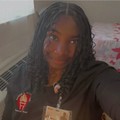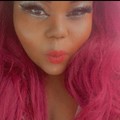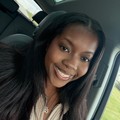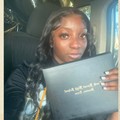I started battling with social anxiety right around the time I entered puberty and moved to the US. Considering the culture I came from, I thought something was genuinely wrong with me because I had always been “okay”. Suddenly, I found myself in a new country, living with my father for the first time, and struggling to understand why everything felt so overwhelming. I was lost.
As a teen, all I wanted was to feel okay and fit in. so I clung to the one thing I had always been good at and felt familiar: school. I’m grateful my mother gave me a positive outlook on education because that’s what kept me grounded when everything felt uncertain. Knowing that I had the chance to learn something new even when everything was falling apart, was a blessing. That love for learning stuck with me, and that’s why I knew I wanted to pursue higher education.
Still, the language barrier and my anxiety made communication difficult. I overcompensated by pushing myself academically, hoping that if I excelled, no one would notice how anxious and quiet I was.
Everything slowly started shifting in my first year of high school, for the first time, a school counselor suggested I try therapy. I was hesitant. But then I finally went, I cried through the first few sessions. Until then, I had been in denial about how deeply my experiences affected me. Just having someone acknowledge my pain changed everything. It allowed me to have a new perspective on life.
I began learning how to be kinder to myself. I permitted myself to rest. I stopped burning myself out to prove I was okay. Therapy, though not always consistent, taught me balance. I learned to connect with people, even in small ways, and I’m grateful for how far I’ve come.
Today, I can speak publicly and advocate for myself. Things my younger self only dreamed of. I’m forever grateful to the teachers who were patient with me when all I could do was quietly turn in assignments and to those who encouraged me to push myself because they saw my potential.
Over time, I’ve learned that compassion matters more than anything because we're all adjusting to life and the challenges it throws at us.
For a long time, I thought being quiet made me invisible. But it turns out, I wasn't. I built real friendships by showing up, even when I was scared. I now know that my differences; my softness, patience, and presence are all strengths. I've had people tell me I made them feel calmer or safer by being there. That’s something I carry with pride.
At the end of the semester, a friend gave me a thank you card. She said it meant everything to have someone simply show up when she was overwhelmed. That moment reminded me that quiet support can be life-changing.
My mother's love for education planted the seed, but I had to keep it growing on my own. Now that I’m close to flourishing, I want to help build a world where students like me; quiet, uncertain, and full of potential can find support and direction. Whether through education and peer mentoring or by advocating for them. I’m committed to being that steady presence I once needed.
My uniqueness does not come from being the loudest. It comes from surviving the silence, choosing kindness, and growing anyway. I know now that someone is always watching, not to judge but to find hope. That’s why I want to be that quiet light for others.
Growing up in Ghana in a lower-class family, where access to basic necessities like food was a daily struggle, taught me the value of resilience and determination. Despite the limited opportunities, I learned to capitalize on every chance that came my way. My educational journey has been marked by numerous challenges, but I have consistently demonstrated my ability to adapt and thrive.
During my high school days, I witnessed my father's debilitating battle with a disease that left him paralyzed for years. This misfortune forced my mother to shoulder the responsibilities of the breadwinner, placing a heavy burden on our family. In response, I became creative and resourceful, opening a small food shop to help alleviate food insecurity exacerbated by the COVID-19 pandemic. This venture not only improved my family's financial situation but also provided me with the resources needed to continue my education.
In school, I co-founded the We Aid You Smile Foundation, which supported street children and women from low-income households. I also led the Gifted Hands initiative, teaching young girls valuable skills like crocheting, making necklaces and earrings, and crafting bags with beads to generate income in order to limit their over dependence on men. Furthermore, I helped establish Food On Wheels, providing nutritious meals for street children. These experiences solidified my passion for social work, a field dedicated to enhancing people's welfare and providing essential resources for their development.
Regardless of the challenges I faced, I found solace in my books, which became a vital defense mechanism. Immersing myself in complex mathematical equations and analytical reading provided a much-needed distraction. While the situation had a negative impact, it also had a profound positive effect: it motivated me to excel academically. I came to realize that my studies were the key to unlocking a brighter future for myself, my family, and potentially, others. This newfound perspective drove me to achieve remarkable success on my SAT exams, scoring 780 in Math and 720 in Reading and Writing, resulting in a total score of 1500.
As someone who has experienced hardship, I am driven to be a source of hope for others. Social work resonates with me because it seeks to improve the economic, social, and biological state of individuals. I am eager to provide support and resources to those in need, empowering them to overcome challenges. Pursuing this dream in the United States has presented new challenges, including securing a stable income to cover educational expenses and living costs. I often rely on borrowed materials such as textbooks and computer, or my mobile phone to complete tasks, which hinders my academic progress.
Despite these obstacles, I remain committed to becoming a social worker, and I believe that this scholarship will be instrumental in helping me achieve my goal. Academic achievements alone are insufficient to complete this journey. To truly make a meaningful impact, I need to overcome various challenges that lie ahead. Receiving this scholarship would be a vital step in addressing these obstacles, empowering me to become a dedicated social worker who can be a pivotal part of someone's success story. Ultimately, this support would enable me to contribute to creating a brighter, more compassionate world, where I can make a lasting difference in the lives of others.
“Be the change you want to see in the world.” This quote by Mahatma Gandhi has always resonated with me. It has taught me the importance of being different and leveraging my uniqueness to make a difference in the lives of others, even those I have no idea are watching me.
As a Christian, I have always been taught to love and serve others. I have a deep love for helping those in need, and it is something that has been instilled in me from a young age. My desire to help others has driven me to become involved in various volunteer organizations and community service events. Through my volunteer work, I have had the opportunity to meet many people and have been able to make a positive impact on their lives.
Growing up, I always felt different from my peers. I was the only black student in my class and often felt like an outsider. However, rather than letting this feeling of difference hold me back, I chose to use it as a source of strength. I realized that being different was not a bad thing, but rather something that made me unique and special.
As I began to embrace my differences, I found that I was able to connect with people differently. I began to see the world through a different lens and was able to empathize with others in a way that I had not been able to before. This newfound perspective allowed me to leverage my uniqueness to make a difference in the lives of others.
One way I have leveraged my uniqueness is through my involvement in a mentorship program for underprivileged youth. As a mentor, I have been able to use my experiences and perspective to provide guidance and support to these young people. Through my interactions with them, I have been able to help them navigate challenges and provide them with a sense of hope and encouragement.
In addition to my involvement in the mentorship program, I have also volunteered at a local homeless shelter. Through my interactions with the residents, I have learned that everyone has a story, and everyone deserves to be treated with dignity and respect. My unique perspective has allowed me to connect with them in a way that goes beyond simply providing a hot meal or a place to sleep. I have been able to offer them a sense of hope and remind them that they are not alone.
I believe that it is through our differences that we can make the greatest impact in the lives of others. As Mahatma Gandhi said, we must be the change we want to see in the world. I am proud of the person I am and the unique qualities that make me who I am. By embracing my differences, I have been able to leverage my uniqueness to make a positive difference in the lives of others, even those I have no idea are watching me.
In conclusion, I am passionate about helping others in need because it is a reflection of my faith and who I am as a person. I believe that it is our differences that make us special and that it is through our uniqueness that we can make a difference in the world. I will continue to leverage my uniqueness to make a positive impact on the lives of others, and I hope to inspire others to do the same. As Mother Teresa said, “Not all of us can do great things. But we can do small things with great love.”
Martin Luther King Jr. once said, “Whatever affects one directly, affects all indirectly. I can never be what I ought to be until you are what you ought to be. This is the interrelated structure of reality.” Dr. King was a unique individual. In a world plagued by the forces of individualism, greed, and discrimination, he strived to fight it by helping others. He beautifully described the essence of humanism: having compassion for those who struggle and taking action to break down barriers that negatively impact people’s lives. Dr. King was unique.
Similarly, to him, what makes me a unique individual is living a life of purpose caring for others with an others-oriented mindset. Having an others-oriented mindset means intentionally pursuing and participating in things that positively impact other people. This mentality is not common in a world where many people strive to pursue a better life for themselves, not caring to help others. What does having this mindset practically look like in my life? For example, I am currently pursuing a bachelor’s degree at Tulane University. However, I am not attending college to receive a good-paying job to live a comfortable life for myself. As I navigate college with an others-oriented mindset, I am using my education to advance my passion for prison reform and make the prison community an inclusive and safe environment for all incarcerated individuals. The culture of sexual violence within America’s correctional institutions continues to prevail. As a result, I am committed to using my major in sociology and other educational opportunities to help the prison community and solve this issue. I plan to address the problem of sexual assault in prisons by conducting academic research on aggression in correction environments. I want to use this research to help determine what prison programs need to be implemented that aim to address the root of violent behavior. As I uniquely live my life with an others-oriented mindset, I intentionally pursue passions that impact underrepresented groups of people in the future.
My unique mindset has also guided me to help underrepresented groups of people in the present day. For example, when I was a college freshman, the prevalence of homelessness in New Orleans bothered me. I wanted to intentionally participate in an initiative to help the unhoused population and provide them with everyday necessities to get them through the day. However, COVID-19 limited how organizations could interact with that population. Therefore, during the spring semester of my freshman year in college, with the help of students and community members, I created the People Power Project. This Project was a student-based initiative to aid the unhoused population in New Orleans. The goal was to raise $2000 to construct 200 care packages that would be distributed to those unhoused in the City of New Orleans. Through active advertising and lobbying, I helped raise $3000 and bought non-perishable food, clothing, and hygiene products to assemble and distribute. My peers and I didn’t fix the systemic problem of poverty, we made a difference by providing some basic needs and helping the unhoused population feel loved and cared for.
I am different because I am passionate about helping others and breaking down barriers hindering people from living safe and healthy lives. My other-oriented mindset has caused me to pursue an education dedicated to reforming the prison system and helped me recently give back to the homeless population.




























